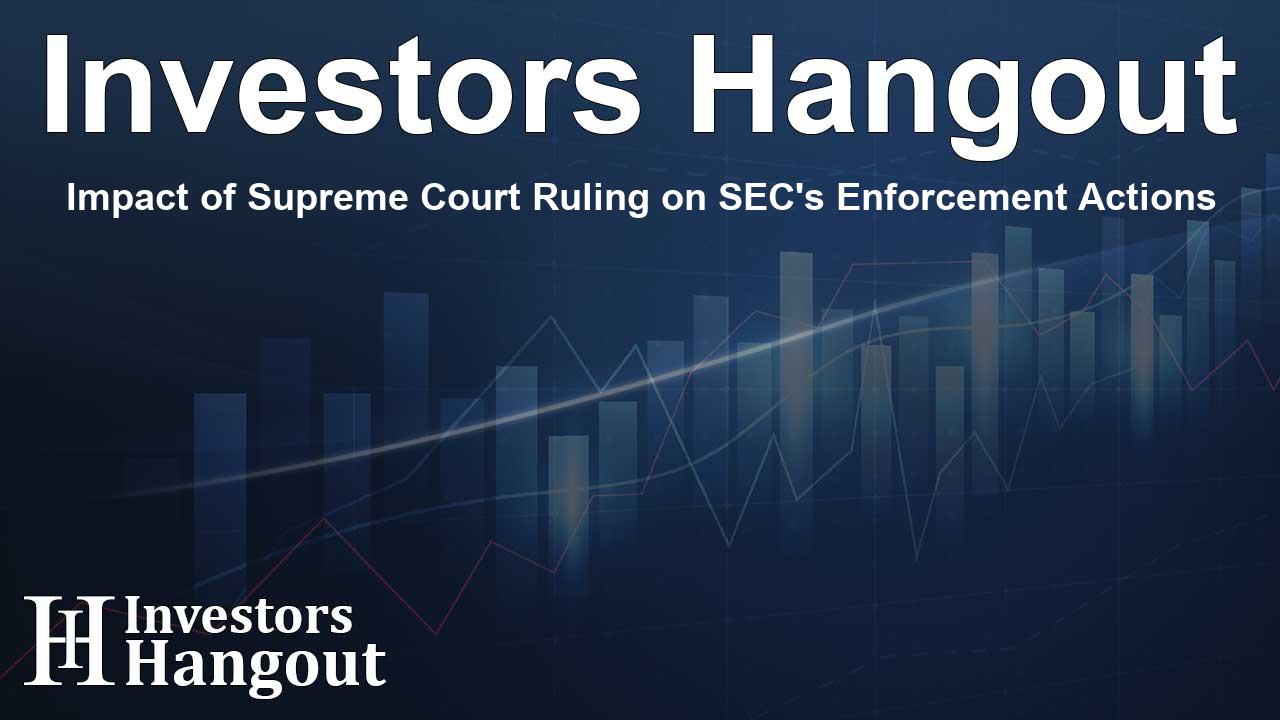Impact of Supreme Court Ruling on SEC's Enforcement Actions

Impact of a Supreme Court Ruling on SEC Enforcement
The U.S. Securities and Exchange Commission (SEC) has recently made a significant move by dismissing all active misconduct cases against accountants before its in-house judges. This decision has stirred discussions among legal experts, indicating a shift in the SEC's enforcement powers following a pivotal Supreme Court ruling.
Dismissal of Enforcement Actions
From early to mid-August, the SEC moved to dismiss eight enforcement actions that had been pending before its administrative law judges. Some of these cases date as far back as 2021, where the agency sought to discipline accountants for alleged improper practices.
SEC's Rationale for Dismissal
Interestingly, the SEC has not provided any public reasoning for this sweeping dismissal, and requests for comment from agency officials have gone unanswered. This move is especially noteworthy considering that the SEC was poised to potentially win in certain cases, prompting speculation about the underlying factors driving this decision.
Impact of the Supreme Court Ruling
The conclusion to abandon these cases appears closely linked to a Supreme Court decision issued in June, which prohibited the SEC from utilizing in-house judges for fraud-related sanctions. Lawyers have noted that this ruling raises significant constitutional concerns related to the right to a jury trial.
Cases Under Dismissal
One notable case involved Edward Hackert, an accountant from New York, who had counter-sued the SEC, claiming the agency's procedures were unconstitutional. His lawsuit was updated in July to reference the Supreme Court's ruling, further complicating the SEC’s efforts to adjudicate such misconduct cases.
Changing Landscape of Enforcement
This dramatic dismissal timeline points to a potential influence of Hackert's legal battle, highlighting the shifting dynamics of the SEC's enforcement strategies. As legal experts observe, this could mark a pivotal moment for the agency.
The Broader Implications
Robert Glicksman, a law professor, noted that this action reflects the SEC's decision to constrain its enforcement capabilities due to fears of judicial pushback.
Previous SEC Actions and Future Directions
Historically, the SEC's actions have been characterized by a commitment to maintaining enforcement through its internal systems, specifically for malpractice cases. However, this new approach could open doors for pursuing cases in federal courts, though this idea remains largely untested.
Details on Other Cases
Among the notable dismissals was that of Ira Viener, an accountant based in New Jersey. He expressed surprise at the sudden withdrawal of the SEC's case against him, describing the previous ordeal as a personal struggle against overwhelming odds.
Conclusion
This turn of events signals a potential transformation in how the SEC handles malpractice allegations against accountants. As the agency recalibrates its enforcement strategies in the wake of the Supreme Court ruling, it invites further scrutiny into its operational framework.
Frequently Asked Questions
What led to the SEC's dismissal of accountant misconduct cases?
The SEC dismissed the cases in response to a Supreme Court ruling that limited its capacity to use in-house judges for certain enforcement actions, raising constitutional concerns.
How many cases were dismissed by the SEC?
The SEC moved to dismiss eight enforcement actions against accountants during August.
What are the implications of the Supreme Court ruling for the SEC?
The ruling may significantly restrict the SEC's enforcement powers, potentially requiring it to adjust its approach in conducting future malpractice proceedings.
Who was Edward Hackert and what was his case about?
Edward Hackert is a New York accountant who countered the SEC's charges of misconduct by claiming the agency's practices were unconstitutional, especially in light of the Supreme Court ruling.
Could the SEC pursue these cases in federal court?
While the prevailing belief is that malpractice cases must be handled by in-house courts, there might be untested avenues for the SEC to take these cases to federal court.
About Investors Hangout
Investors Hangout is a leading online stock forum for financial discussion and learning, offering a wide range of free tools and resources. It draws in traders of all levels, who exchange market knowledge, investigate trading tactics, and keep an eye on industry developments in real time. Featuring financial articles, stock message boards, quotes, charts, company profiles, and live news updates. Through cooperative learning and a wealth of informational resources, it helps users from novices creating their first portfolios to experts honing their techniques. Join Investors Hangout today: https://investorshangout.com/
Disclaimer: The content of this article is solely for general informational purposes only; it does not represent legal, financial, or investment advice. Investors Hangout does not offer financial advice; the author is not a licensed financial advisor. Consult a qualified advisor before making any financial or investment decisions based on this article. The author's interpretation of publicly available data shapes the opinions presented here; as a result, they should not be taken as advice to purchase, sell, or hold any securities mentioned or any other investments. The author does not guarantee the accuracy, completeness, or timeliness of any material, providing it "as is." Information and market conditions may change; past performance is not indicative of future outcomes. If any of the material offered here is inaccurate, please contact us for corrections.